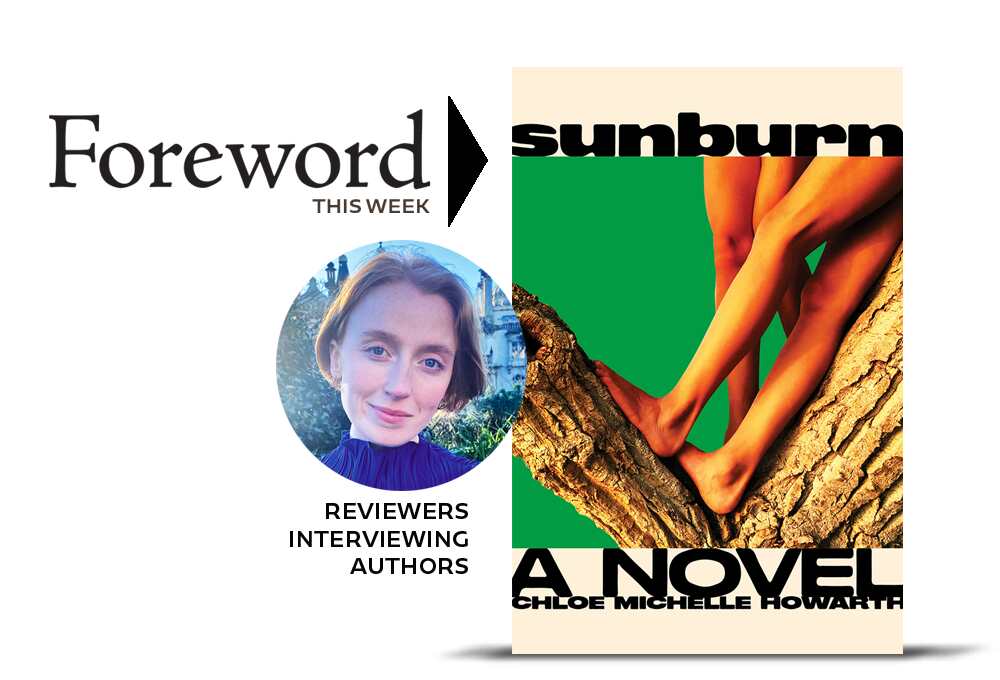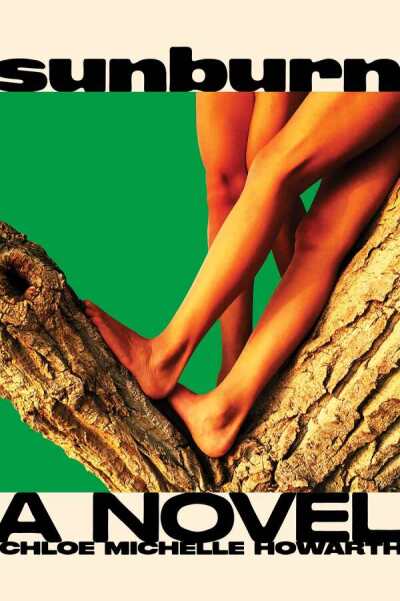Reviewer Brooke Shannon Interviews Chloe Michelle Howarth, Author of Sunburn

This week we’re joined by Chloe Michelle Howarth, an Irishwoman whose debut novel explores the forbidden love of teenagers Lucy and Susannah in rural Ireland during the early 1990s—a time when homosexuality was criminalized in that very Catholic place and “motherhood [was] the nearest thing to an inherited career.”

In her starred review of Sunburn, Brooke Shannon calls the coming-of-age novel a “poignant, slow-burning portrait of queer youth … fueled by intense, penetrating prose.” Captivated, Brooke jumped at the chance to connect with Chloe to talk writing and Irish storytelling.
Chloe’s prose leans literary, which got us thinking about the INDIES winners in the 2024 Literary Fiction category—all of them fantastic—Beautiful Dreamers (gold); Country of Under (silver); Sleepaway (bronze); Inside the Mirror (honorable mention). Digital subscriptions to Foreword Reviews are free.
Your debut novel, Sunburn, is narrated by protagonist Lucy, whose voice follows a lyrical rhythm reminiscent of a confessional prayer. How did you develop her emotional cadence?
Lucy’s voice came quite naturally to me, as I enjoy writing in that ornamental style. As someone who grew up in rural Ireland, the Catholic imagery was second nature. It was important to me to try to give some gravitas to the dramatics of adolescence, so I leaned into the intensity of the emotions Lucy was feeling. Her voice came together when I combined all of that with the lyrical, musical way that Irish people speak. Allowing myself to go big with the prose was indulgent—I loved it.
Full of subtext, the letters between Lucy and Susannah feel like emotional exhalations. How did you make these epistolary moments blend so naturally with Lucy’s narration? What do you believe the letter form allows us to express that other forms of communication don’t?
It goes back to Lucy’s narrative voice being so dramatic and romantic. The letters she writes are a truer expression of her feelings than the things that she can say to Susannah or anybody else. The pairing of her inner monologue being so intense and her opportunities for expression being so limited is what gives the letters that sense of exhalation you mentioned.
As for the letters, they are the perfect place for honesty. As opposed to conversation, email, or texts, with a letter, there is no option for immediate response. The act of writing back and forth in that way might allow for deeper thought, and the distance between reading and replying leaves room for vulnerability. There is also more anonymity with letter writing, so you can let loose a little more.
The rural Irish town of Crossmore acts as its own character. Lucy preens for its affection while rejecting its limits, wondering if “domesticity is a good thing to work towards,” yet describing the town as a “sad dream.” Did this duality come from your dealings with your hometown?
Yes and no. Luckily, I wasn’t raised in a household with the same values as Lucy was, and so the pressure that she feels to assimilate to the town and its traditions wasn’t put on me. However, the feelings of both loving and hating your hometown at once are something I can relate to. I think a lot of teenagers go through that, where they want to rebel against the things that they know, but also just want to feel accepted and held by them.
The novel contains vivid detail—from the squelching of spit “raising a hundred decibels,” to “a golden crust of pus on [Susannah’s] bitten and infected cuticle.” In one moment, Lucy even imagines herself as the “microbes in the beef” Susannah consumes. Can you speak to your use of sensory writing to evoke adolescent desire and revulsion? Were there influences that gave you permission to go there?
I’ve always enjoyed writing in that way. Writing about things like pus and enzymes can be romantic, and I think it creates a real sense of intimacy and vulnerability. I let myself lean into it. That style is more interesting for me than more traditional descriptions of romance or desire. In terms of influences that allowed me to explore that, The Virgin Suicides is one of my favourite books, and it has hints of that sort of language. But I also think it goes beyond literature. I’ve always sought out that sort of exploration of beauty and desire—for example, the work of Petra Collins and Harry Clarke.
Lucy often metaphorizes Susannah as a source of light (“Susannah, beautiful sunbeam Susannah”). Did this imagery influence your choice of title, or does Sunburn carry a different symbolic weight?
Yes, the title and the imagery of Susannah are definitely tied together. I wanted Susannah to take the place of the sun in Lucy’s universe, and I tried to describe her in as golden and warm a way as I could. Sunburns are very bittersweet; they’re painful reminders of happy times. That bittersweet, painful, hot feeling is kind of inescapable in the book, and it sums up the relationship between Lucy and Susannah quite well.
Sunburn offers slight hope that Lucy and Susannah might end up together, yet there’s no tidy resolution. Was there ever a version of the ending that provided more closure?
There was never a more definite ending than the one in the book. With characters as complicated, in a situation as complex as theirs, I don’t think that a concrete ending would be very true to the story. I like endings that make me think—sometimes they’re better than being told exactly what happens next. It’s good for readers to allow their imaginations to take over after the last page. Lucy and Susannah belong to the readers, and so it’s up to them what happens next.
We’re eagerly awaiting your sophomore novel, Heap Earth Upon It, slated for release in October 2025. What can we expect from what’s being pegged as Sunburn’s “darker sister”?
I’m excited about this book! It’s certainly darker than Sunburn, and I think (I hope) my writing has matured a bit. What they have in common is the theme of longing … or obsession, depending on how you view it. In Sunburn, the longing is very romantic, sweet, and comes from a place of innocence and true love. Whereas in Heap Earth Upon It, the longing is much more severe. It is more unfiltered, urgent, and misunderstood. Definitely spookier, stranger vibes—I love it.
Brooke Shannon
